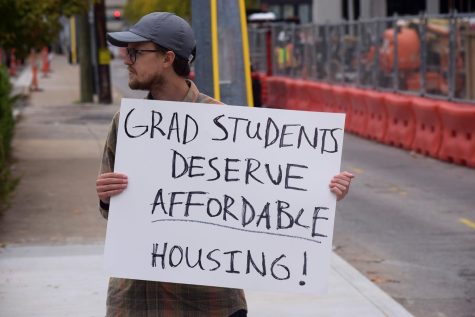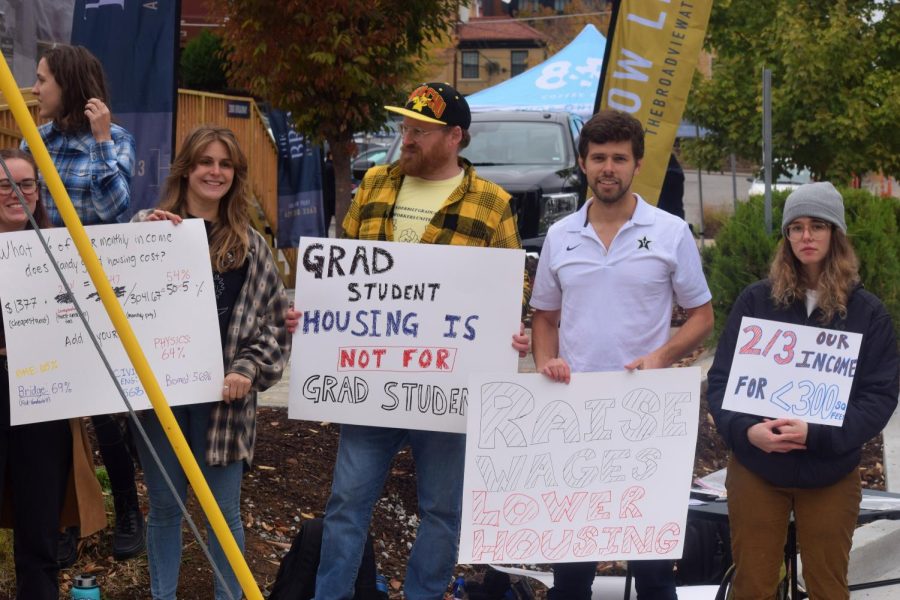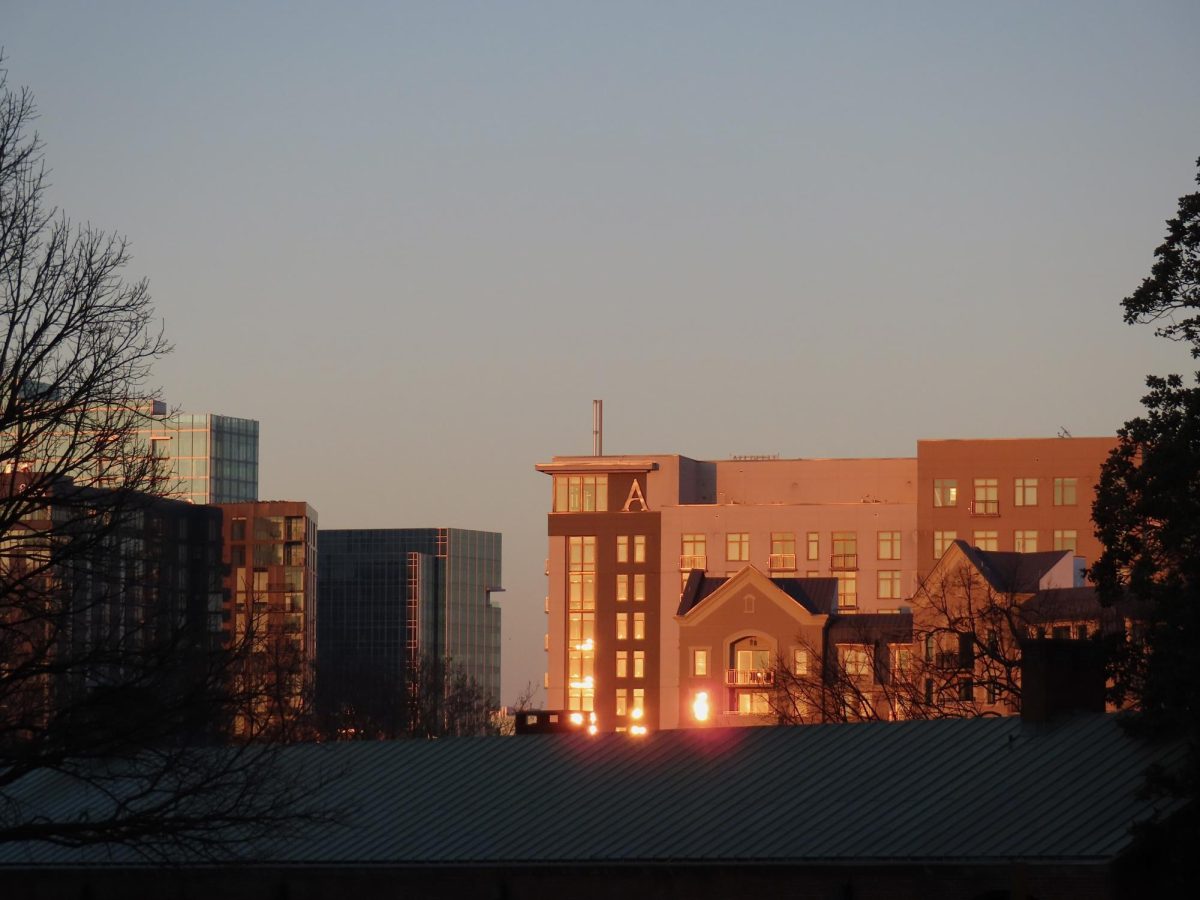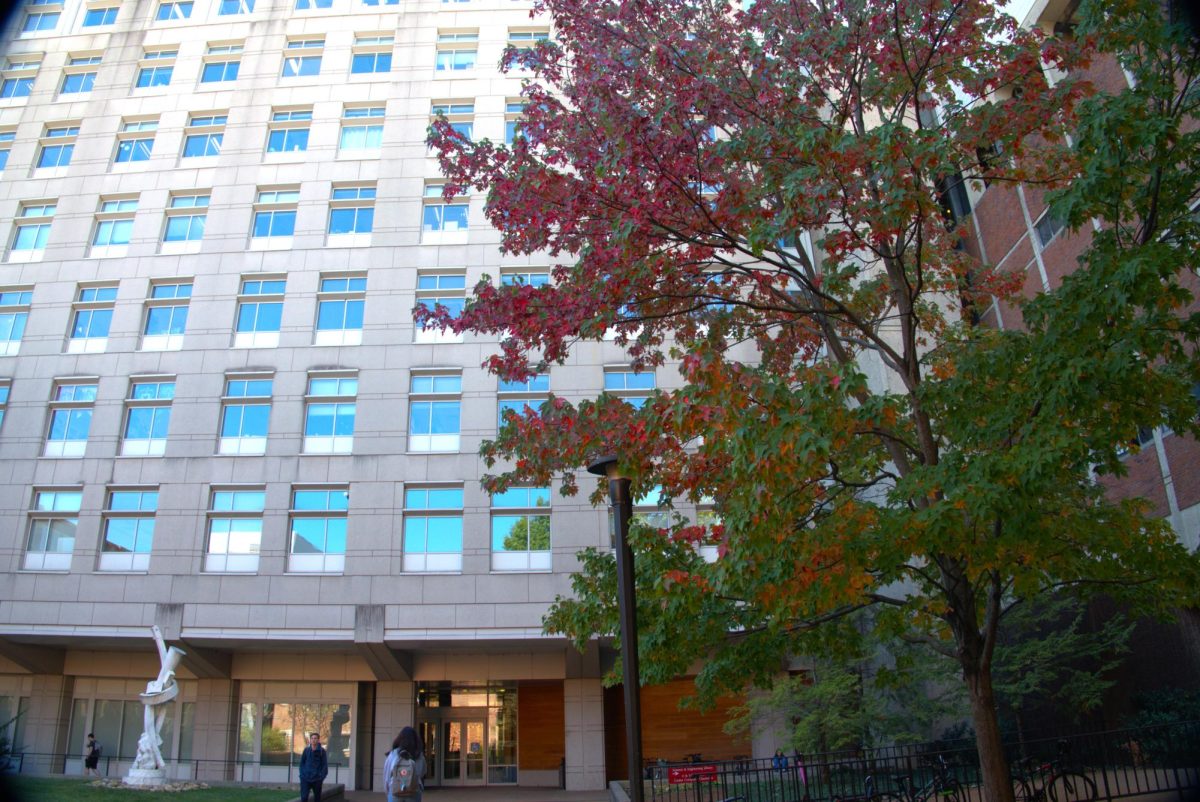Vanderbilt Graduate Workers United and the Organization of Black Graduate and Professional Students held the “Rally for Affordable Housing” outside the leasing center for The Broadview at Vanderbilt on Oct. 26, during its grand opening. The Broadview is a graduate and professional student residential community, set to open this coming fall.
Graduate students led by Kelly Cunningham, Co-President of VGWU and fourth-year graduate student, stood on the corner of 20th Avenue and Broadway with signs reading “Grad student housing is not for grad students,” “⅔ our income for <300 sq. ft.,” “Vandy pay too low to afford Vandy rent” and other similar messages. The groups also spoke with graduate students who attended the grand opening of the leasing center.
Per Cunningham, prices for the new apartments range from $1,377 to $1,924 per month. According to Cunningham, average stipend rates are not released by the university, but she estimates them to be around $30,000 from her experience talking to other graduate students. Stipends vary depending on the program and department in which the student is studying.
“[Vanderbilt] has been promising to build this for at least three years now. A couple weeks ago, they announced the rates for the graduate student housing, and we were stunned because it’s well over 50% of most graduate students’ stipends,” Cunningham said.
Cunningham said the main goal of the protest was to raise awareness about the profits that will be made by Vanderbilt through The Broadview. VGWU has previously organized around the affordability of other essential services, including by protesting and circulating a petition for more vision and dental insurance coverage in September.
“We’ve definitely been aware of how rising rent in Nashville has been affecting grad students the last few years,” Cunningham said. “Most of our efforts so far have been on a smaller scale.”
Cunningham added that this rally was the first time they dealt with housing affordability in particular.
In a statement to WKRN, the university said that rates for new graduate housing at The Broadview were about 18% lower than market rates of similar apartments in the area. The Broadview at Vanderbilt is owned by Balfour Beatty Campus Solutions and Axium Infrastructure. The University’s statement said their partnership with BBCS/Axium will lead to consistently lower rates for the Broadview at Vanderbilt, compared to other market rates. The statement cited campus accessibility and popular amenities as goals of this project.
“This project will help build interdisciplinary connections among these students and support the university’s strategic priorities, including its commitment to sustainability, diversity and accessibility. It also enhances Vanderbilt’s ability to recruit the best students to our rapidly growing city,” the statement reads.
In an updated statement to The Hustler, Vanderbilt said The Broadview is not university-owned and operated. Vanderbilt provided the land, but the building itself is managed by BBCS/Axium, which means that Vanderbilt does not control the rental rates.
“The Broadview is a lower-cost housing option with popular amenities and easy access to campus. While it is not university-owned and operated, our intent, through public-private partnership, is to support an additional choice for Vanderbilt graduate and professional students as they seek housing in the city,” the updated statement said.
The statement further said the partnership of BBCS/Axium with Vanderbilt requires them to maintain lower rental rates than comparable, market value housing.
Cunningham said that housing affordability was an important factor when she decided where to go to graduate school, but since she started her program at Vanderbilt, Nashville’s housing prices have skyrocketed from an average of $269,000 in Jan. 2018 to $448,645 this month.
“We’re just hoping Vanderbilt will recognize that they need to pay us more if they’re claiming that these are below market rates, which they’re not. They are if you go by total rent, but if you go by square foot, then it’s one of the most expensive places in Midtown,” Cunningham said. “If this is what it costs to live here, then they need to pay graduate students enough to live here. Otherwise, they’re not going to be able to recruit good graduate students. The wage I’m making now is not a livable wage in Nashville with all these rising costs.”

Miguel Moravec, President of the Graduate Student Council and third year graduate student, attended the rally. He said this new housing is an important option for graduate students, specifically for international students.
“The apartments have the potential to make housing more accessible to international students, who often have trouble working with Nashville landlords that require domestic banking information,” Moravec said.
He further said that the cost of this housing makes it inaccessible to PhD students, as the least expensive apartment costs more than half of most students’ stipends. This does not meet the criteria for affordable housing as set out by the Federal Housing and Urban Development Agency, which stipulates that housing is considered affordable if the resident is paying no more than 30% of their gross income. According to the Vanderbilt Graduate School website, with variation from one program to another, Ph.D. students can expect to receive teaching/research assistantships that pay all or part of tuition, medical insurance and a supplemental income stipend ranging from $14,000 to $30,000 per year for five years.
“This facility will enable graduate students and their families to live in the heart of Nashville during the city’s period of rapid economic growth—which supports our abiding mission to be a diverse and inclusive learning environment in which talented individuals from all financial backgrounds can thrive,” Chancellor Daniel Diermeier said in a July 16, 2021 press release.
Some other universities also offer on-campus housing options for graduate students. Duke University offers limited housing to graduate students, prioritizing students based on visa status. Duke’s website states that it is the student’s responsibility to acquire housing. On July 20, 2021, Emory University announced that the university would build housing for 1,000 graduate students by 2027. Washington University in St. Louis offers only off-campus housing options for graduate students. The aforementioned universities do not specify the percentage of graduate students’ stipends designated for housing costs.
According to Moravec, the university is distancing themselves from the new housing development.
“In response to the public seeing how expensive the units are compared to our stipends, Vanderbilt is now backtracking and no longer claiming that the units are low cost,” Moravec said. “In fact, they’re distancing themselves even further and are now denying responsibility for operating the facility, even though they were taking credit for being a co-operator as recently as last week.”
OBGAPS Vice President Ebony Hargrove-Wiley said that she supports the efforts of VGWU because the proposed rent prices are not affordable for students from all backgrounds.
“If 50% of my stipend is allocated to rent, I would struggle to pay other bills like my car notes and other basic necessities like food. Affordable housing can ensure my current and future financial wellness and freedom,” Hargrove-Wiley said.
Cunningham said she hopes this rally raised awareness for the financial strains faced by graduate students, and will increase support for an upcoming rally that will be hosted by VGWU on Nov. 1 to promote higher wages for graduate students.
The Broadview at Vanderbilt did not respond to The Hustler’s request for comment.











